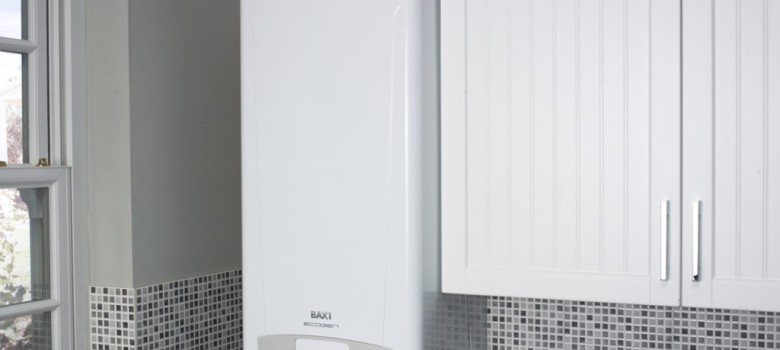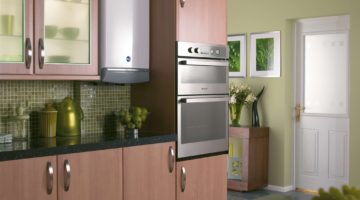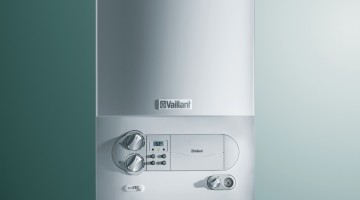
What are CHP boilers?
Combined heat and power (CHP) boilers produce both heat and electricity in one single process. This process is sometimes referred to as cogeneration and the technology that supports it has been around since the 1970s, but has mainly been confined to industry and large dwellings such as hospitals and sports centres.
As the price of fuel has increased over the last few years, it now makes economic sense to bring CHP technology into the domestic setting.
A micro-CHP boiler is defined in the EU Act on Cogeneration as a domestic unit that is limited to 50kW of capacity.
The different types of CHP boiler
There are three types of micro-CHP boiler:
The Stirling engine CHP boiler
The Stirling engine CHP boiler is a type of external combustion engine, where the combustion engine is heated when the boiler is fired up to produce the hot water. This heats up the fully enclosed working gas within the Stirling engine, causing it to expand. The expansion of the working gas forces a piston to turn up and down between a copper coil, generating an electrical current, which can then be used in the home. The working gas usually used in a Stirling engine is helium, due to its strong heat transfer properties.
The main limitation of this type of boiler is that it only produces electricity when you have the central heating on, so despite being a very efficient type of boiler, it does not produce an abundance of electricity. A key advantage is that the combustion process involved in a Stirling Engine CHP boiler is much quieter and more efficient than internal combustion engines.
The internal engine CHP boiler
This type of CHP boiler is commonly used in large dwellings such as hospitals. It involves using a fuel source to drive a turbine, which is connected to the electricity generator. The waste heat from this combustion process is captured to produce hot water for the space heating and warm water. This is the most common form of CHP boiler found to date. However the process is noisy and you have far less control over the hot water generated, so fuel cell and the Stirling engine CHP boilers are often preferred.
Fuel cell CHP boiler
Fuel cell CHP boilers use fuel cells which convert fuel and air directly into power and heat through a quiet, efficient, solid-state electro-chemical reaction. A video demonstration of how a fuel cell CHP boiler operates in the home can be found on the Ceres Power website.
Fuel cells generate power significantly more efficiently than internal combustion and Stirling engine CHP boilers. This is because fuel cell CHPs convert chemical energy directly to an electrical current, maximising their efficiency.
This type of CHP boiler is still in development so is not yet commercially available on a wide scale.
How CHP boilers work in the house
A home would typically use a boiler to meet its heating and hot water needs only, and then source its electricity from the grid. Central generation wastes a significant proportion of the energy it creates, through heat losses in the power station and in the transmission and distribution network.
Micro-CHP boilers avoid these losses, and capture the heat for use within the home. This efficiency can save the consumer around 25% of total energy costs (around £600 off your bill if you have a typical 3-bed semi-detached house), and reduce each home’s CO2 emissions by up to 1.5 tonnes per annum. Micro-CHP boilers are designed to generate all of the heating and hot water and a significant percentage of the electricity needed by a typical UK home.
The CHP boiler can use a variety of fuel options including the gas that is supplied by your current provider, but also hydrogen, LPG & biofuels. Even during the summer when the home’s central heating system is turned off, the heat produced by the micro-CHP boilers when generating electricity can be stored in a back-up hot water cylinder and then used for domestic hot water. Therefore the micro-CHP boilers are capable of operating all year round, maximising energy bill savings 365 days a year.
Micro-CHP boilers are designed to one day replace your normal condensed boiler, using the same types of connections; they also have similar installation and maintenance requirements. A micro-CHP boiler only requires one connection to the electricity network in the house and it’s ready to go!
Industry development
Micro-CHP boilers are an example of a microgeneration product for the home. The UK Government has estimated that microgeneration products (such as micro-CHP boilers) have the potential to supply over 30% of the country’s total electricity needs and help meet its international environmental obligations, such as the 2020 EU carbon emission reduction targets. Owning a micro-CHP boiler is one step in the right direction. Full costs in the UK of a micro-CHP boiler including installation are yet to be made fully transparent; however incremental cost estimated in the region of £2,500 to £3,500 versus a condensing boiler, therefore a full installation is then estimated at between £5,000 to £7,000.
Research commissioned by the Government has shown that micro-CHP boilers have the potential to become the micro-generation ‘system of choice’, replacing the condensing boiler, which is the standard system in most UK homes today. Commercial experience has also shown that realising the benefits early pays off the most over the long-term.
Currently only the Stirling engine-type micro-CHP boilers have been made available on the domestic market. For example the Baxi Ecogen product is one of the few available micro-CHP boilers that is commercially viable and available for the home. By the middle-end of this decade, the expectation is that fuel cell models such as the Baxi Gamma 1.0 will be fully available to the UK consumers.
When fuel cell micro-CHP technology is commercially available, the consumer should see the price of Stirling engine models fall. In addition with the competition in the fuel cell space (Baxi, Ceres Power, etc), this should also make those models commercially competitive. Current evidence suggests that the take-up in UK homes has only been limited, with a lower number of Micro-CHP boilers currently installed in the UK than expected by the government – as opposed to Denmark and Germany where the technology has been more widely adopted.
CHP Boiler Technology Summary
The following list is a quick summary of the CHP boiler features:
- Delivers central heating, hot water and electricity
- Simple to install, replacing an existing gas boiler
- Easy to use with automatic operation
- Can use the same gas supplied by British Gas, NPower and other gas providers
- Lifespan of the fuel cell boiler, yet to be determined (but typically 10-12 years)
Remember micro-CHP boilers are efficient because they generate heat and electricity in one place. They will save you money and help the environment. Currently only the sterling engine type of CHP boilers are available to the residential market (internal engine CHP boilers are available for large properties), but in a few years’ time fuel cell micro-CHPs will also be available. Micro-CHP boilers are a strategic domestic technology for micro-generation that will help homes with their energy needs, but also help the UK (and other EU countries) meet external carbon emission targets.
Benefits
- CHP boilers are more environmentally friendly, reducing a typical home’s CO2 (carbon dioxide) emissions by up to 1.5 tonnes per annum in the UK.
- Mounting a CHP boiler can help you reduce your energy costs by 25% or more.
- Most CHP boiler manufacturers have partner agreements with the major suppliers (e.g. with British Gas) who provide installation services. Potential customers should check first with the manufacturer if you would like to arrange their own private installation.
Limitations
- The payback on the premium, which is the additional cost of a CHP boiler versus a condensing boiler, can pay for itself over the product’s lifetime. Note: Research in this area is not extensive as there are currently only a few commercialised producers of domestic CHP boilers.
Cost
- The full cost of installing a CHP boiler is somewhere between £5,000 to £7,000, depending on the type of installation and home specification, which is quite a big investment for a typical household.












Baxi Gamma 1.0 & Ceres Power Residential CHP links are dead
Hi Mal- thanks for letting us know. This has been updated. Unfortunately despite the enthusiasm for fuel cell boilers in the domestic home being quite high a few years ago, we are probably a few years away now in terms of seeing this solution being widely available. Unfortunately Ceres Power is no longer looking to roll out a domestic unit due to restructuring of its business operations.
You fail to mention the company already supplying units to various local authorities in Germany, Netherlands and other main land european countries and certified for feed in tarrifs.- Ceramic Fuel Cells ltd.
What I need to know is where to buy the retched thing (CHP Boiler) With help from Which? I have found one supplier Mytub.co.uk But I would like to find others too. Can you help?
Thanks, Peter
Flow Energy Group has launched their mCHP boiler with a package that actually offsets the entire cost of the boiler with the Feed in Tariff. You pay for installation, take out a monthly finance package to pay for the boiler and flow credits you with an equivalent payment back from the Feed in Tariff.
The problem with Flow Energy is that they totally control the process and give you a token saving. What I want to know is where I can buy a fuel cell CHP unit outright and take the risks and the profit.
I am waiting ………….. mmm.
And I read that Ceramic Fuel Cells Ltd, an Australian company has gone into liquidation (15th April 2015). So what next??
BREAKING NEWS – Ceramic Fuel Cells in Germany was acquired by Solid Power on 1st July 2015, an Italian developer of fuel cell microCHP. It will continue to be sold in Germany and Benelux. Possibly in UK but not yet confirmed. Other microCHP products expected to come to market over the next 18 months from Inspirit, Sustainable Power and others. Early days still but market is beginning to develop… Costs are likely to be above the range mentioned in this article for the next few years so not for those who think that £2,500 for a new boiler from British Gas is expensive!
What is the date on this article?
Hi Luke,
This was written in 2013. You can find more information here!
Hi could you please give me some information on domestic chp for a 4bed semi detached, would you know of a rough price for this installed
Massive shame about the turn away from domestic CHP market. SOFC has the capability of going fully autonomous and reusing it’s carbon waste. Electrolysis of water is up to 96% efficient, excess energy produced during the day by solar can be used to electrolyse water and the hydrogen can reform the CO and CO2 wastes into natural gas/ syngas to supplement the gas supply. On a national level, our renewables could be supplementing the gas supply by raising the Hydrogen content to former town gas levels
what is the smallest CHP boiler you have? We are looking for biogas fired CHP boiler for domestic use and marketing in Bangladesh
I would like to buy a micro CHP outright and do my own fitting
What about replacements for internally sited oil boilers
I have a Baxi Ecogen CHP boiler that has broken down. Have you a qualified engineer who is able to repair my boiler. I live in Scarborough YO12 5QP.
Regards
Graham J Elliott